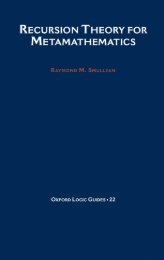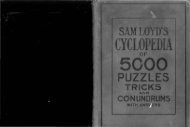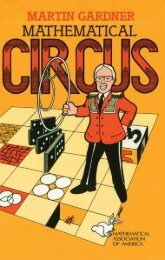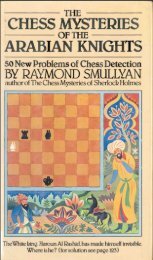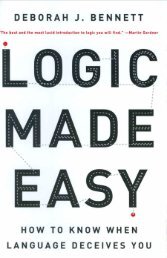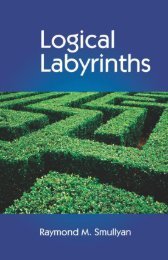Which Alice?
Which Alice?
Which Alice?
Create successful ePaper yourself
Turn your PDF publications into a flip-book with our unique Google optimized e-Paper software.
Introduction<br />
In the volume you now hold, <strong>Alice</strong> and her friends are back again<br />
for a puzzle romp behind the Looking-Glass that will please<br />
Carrollians as much as the first book of chess puzzles pleased Baker<br />
Street Irregulars. Ray has done it again. His characters not only talk<br />
and behave exactly like the originals, but the book also swarms with<br />
typically Carrollian word play, logic and metalogic problems, and<br />
dark philosophical paradoxes. In Carroll's nonsense world there<br />
were two <strong>Alice</strong>s: the imaginary one and his real-life child-friend<br />
<strong>Alice</strong> Liddell. In Ray's nonsense world there are also two <strong>Alice</strong>s: a<br />
friend of Ray's, and the imaginary <strong>Alice</strong> of his first book. Carroll<br />
would have loved them both. And he would have been delighted by<br />
Ray's looking-glass package that unwraps itself only when you try to<br />
wrap it, and a hundred other whimsies that Carroll might have<br />
thought of himself if he had been capable of dreaming up<br />
Raymond Smullyan.<br />
As always in Ray's books, curious metaphysical questions have a<br />
way of catching you by surprise. For example, when Humpty<br />
Dumpty tells <strong>Alice</strong> she should think of everything, <strong>Alice</strong> sensibly<br />
declares this to be impossible.<br />
"I never said you could," Humpty replies. "I merely said you<br />
should."<br />
"But is it reasonable to say that I should do something that I<br />
cannot do?"<br />
"That is an interesting problem in Moral Philosophy," answers<br />
Humpty, "but that would take us too far afield."<br />
It would indeed! Ray does not tell you, but Humpty has raised a<br />
famous problem known as Hintikka's paradox, after Jaako Hintikka,<br />
a leader of a fashionable new school of "possible worlds"<br />
philosophers. Is it proper to call morally wrong something a person<br />
cannot do? Hintikka has a notorious argument designed to show it<br />
is wrong to try to do something impossible. There is now a large<br />
literature on this strange question, which belongs to a type of modal<br />
logic called deontic logic. We learned from Carroll that Humpty is<br />
an expert on classical logic and semantics. Now we learn from Ray<br />
that the egg is also an expert on modal logic!<br />
A page or two later, Humpty bewilders <strong>Alice</strong> with an amazing<br />
one-sentence version of another famous paradox that goes under<br />
ix




